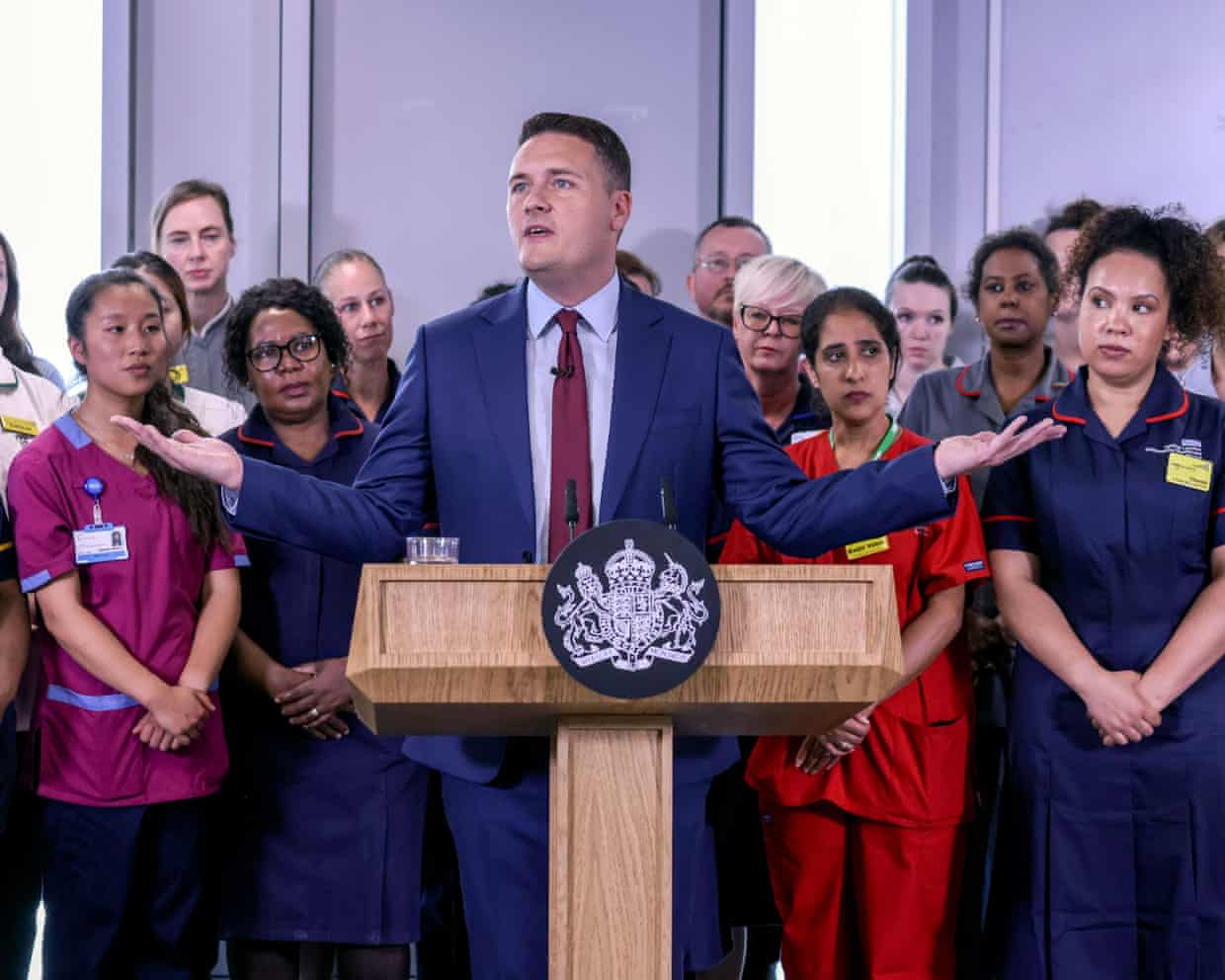Health
Wes Streeting’s NHS Reforms: A Gamble on Healthcare’s Future

The future of the National Health Service (NHS) in the UK hinges on reforms proposed by Wes Streeting, the Secretary of State for Health and Social Care. With the NHS facing severe challenges, including lengthy waiting lists, Streeting’s strategy aims to cut approximately 18,000 back-office jobs, redirecting savings of around £1 billion annually towards frontline care. This plan, however, comes with significant risks, particularly as it is rolled out during ongoing strikes by medical professionals and amidst a critical winter season.
Current polling by the Health Foundation indicates a disconnect between public perception and reality; many Britons remain unaware that NHS waiting lists have actually begun to decline. In September, only a quarter of respondents recognized that waiting lists had fallen during Labour’s first year in power. The prevailing assumption seems to be that these lists continue to grow, a sentiment reinforced by personal experiences of friends and family.
Streeting’s recent media appearances have been overshadowed by internal party politics, particularly accusations aimed at Keir Starmer, the Labour leader, regarding potential leadership challenges. Such distractions have not deterred Streeting from his mission. His proposed job cuts, while aimed at streamlining the NHS, are sure to be met with resistance as many employees face uncertainty about their futures, especially with the holiday season approaching.
Despite the challenges, there are glimmers of hope. NHS waiting times saw a decrease for the first time in 17 years earlier in 2023, with 61.8% of patients being treated within 18 weeks of referral. Streeting asserts that the NHS could achieve a target of 92% by 2029, a goal set by the previous Labour government but missed consistently over the last decade. Achieving this target hinges on Streeting’s ability to balance necessary reforms with maintaining the support of healthcare professionals.
The strategy to merge NHS England with the Department of Health and Social Care aims to reduce bureaucratic overhead while enhancing the autonomy of effective hospital trusts. This approach is seen as a potential model for government service delivery across various sectors, leveraging digital tools and artificial intelligence to improve efficiency. However, the success of such a plan relies heavily on the cooperation of healthcare workers, many of whom are wary of job security in this evolving landscape.
Streeting’s frustration with the British Medical Association (BMA) has surfaced, particularly as doctors prepare to strike once again, despite having received a 28.9% pay increase last year. He has criticized the BMA for opposing higher taxes on doctors while simultaneously advocating for increased state funding. This ongoing conflict risks alienating the very professionals whose support is crucial for successful healthcare reform.
As Streeting pushes for these reforms, the stakes are high. If successful, the changes could alleviate patient suffering and restore public faith in the government’s ability to improve essential services. Conversely, failure could lead to further disillusionment with the Labour Party and the NHS.
The public’s perception of NHS reforms is pivotal. With many attributing the struggles of the healthcare system to immigration, addressing the root causes of long waiting lists could help foster a more constructive dialogue about the skills and resources the country needs. If Streeting can effectively implement his reforms while navigating the complexities of NHS politics, he may position himself as a strong candidate for leadership within the Labour Party.
The path ahead is fraught with challenges, but if Wes Streeting can balance the demands of healthcare professionals and the expectations of the public, he may redefine the future of the NHS and secure his place in the Labour Party’s hierarchy. As the government embarks on this critical journey, the outcome could shape the political landscape for years to come.
-

 Science3 weeks ago
Science3 weeks agoOhio State Study Uncovers Brain Connectivity and Function Links
-

 Politics3 weeks ago
Politics3 weeks agoHamas Chief Stresses Disarmament Tied to Occupation’s End
-

 Entertainment3 weeks ago
Entertainment3 weeks agoMegan Thee Stallion Exposes Alleged Online Attack by Bots
-

 Science4 weeks ago
Science4 weeks agoResearchers Challenge 200-Year-Old Physics Principle with Atomic Engines
-

 Entertainment3 weeks ago
Entertainment3 weeks agoPaloma Elsesser Shines at LA Event with Iconic Slicked-Back Bun
-

 World2 weeks ago
World2 weeks agoFDA Unveils Plan to Cut Drug Prices and Boost Biosimilars
-

 Top Stories3 weeks ago
Top Stories3 weeks agoFederal Agents Detain Driver in Addison; Protests Erupt Immediately
-

 Business2 weeks ago
Business2 weeks agoMotley Fool Wealth Management Reduces Medtronic Holdings by 14.7%
-

 Entertainment2 weeks ago
Entertainment2 weeks agoBeloved Artist and Community Leader Gloria Rosencrants Passes Away
-

 Business3 weeks ago
Business3 weeks agoHome Depot Slashes Prices on Halloween Favorites Up to 75%
-

 Top Stories3 weeks ago
Top Stories3 weeks agoOrioles Hire Craig Albernaz as New Manager Amid Rebuild
-

 Business2 weeks ago
Business2 weeks agoShutdown Impacts Millions as Deadline Approaches, Pressures Congress









